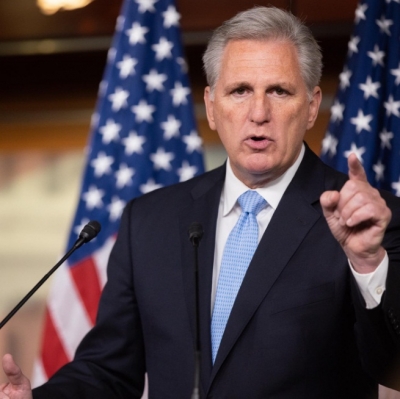BY TN ASHOK
Washington— US President Joe Biden is racing against time, fresh after his successful trip from Hiroshima after the G7 summit, and has scheduled an SOS meeting on Monday with Republican House Speaker Kevin McCarthy to resolve the debt ceiling crisis before June 1.
After that time, the Treasury will run out of money to honour interest payments to stakeholders.
President Biden and House SpeakerMcCarthy are scheduled to meet at the White House in what the US media has described as a pivotal moment to forge a budget compromise to raise the nation’s borrowing limit before June01 and avoid what economists claim could be a catastrophic effect on the money markets and global stock exchanges .
The meeting will be significant as both leaders race to prevent a cash crunch after a weekend of start-stop talks.
Both Biden and McCarthy now appear upbeat as the deadline nears for the US treasury to run out of money to pay its bills.
NBC news reported that Biden and McCarthy spoke on phone on Sunday while the President was returning home on board the Air Force One.
“It went well, we’ll talk tomorrow,” Biden said in response to a question on his return late Sunday.
Meanwhile, negotiators met for over two hours at the Capitol late Sunday evening, saying little as they left.
Financial markets turned down last week after talks stalled, multiple media reports said.
McCarthy told the media that his talks with Biden on Sunday had “productive”, but the on-again, off-again negotiations between his staff and White House representatives were leaving little glimmer of hope on a quick and rapid solution as they are focused on spending cuts, which the White House wants of the table.
The spending cuts affect Bidens vote banks as they mostly relate social welfare spending and senior citizens benefits. .
The contours of an agreement appear within reach, media reports claimed saying the negotiations narrowed down on a 2024 budget year cap, a key to resolving the gridlock. Republicans are firm next year’s spending cannot be more than current 2023 levels, but Democrats have refused to accept the steeper cuts McCarthy’s team first proposed in their bill in the house. .
The sooner a budget deal is reached it would help unlock a separate vote to lift the debt ceiling and allow more borrowing to pay the bills on the debt. The debt that breached the 31.4 trillion mark has to pave the way for fresh borrowing to pay bills on debt already incurred.
Treasury Secretary Janet Yellen said on Sunday that June 1 is a “hard deadline”.
“We’ll keep working,” said Steve Ricchetti, counselor to the president, as the White House team exited talks late Sunday.
McCarthy said: “I think we can solve some of these problems if he (Biden) understands what we’re looking at. But I’ve been very clear to him from the very beginning. We have to spend less money than we spent last year.”
Reports said McCarthy came out of the Capitol Hill meeting sounding optimistic but was very careful not to criticize Biden’s trip, as he had done before.
However he said: “There’s no agreement on anything.”
Biden told the media at Hiroshima before his flight back home that Republicans must accept the reality, there is no deal to be made solely, solely, on their partisan terms.
The President said he did his bit to raise the borrowing limit so the government can keep paying its bills, by agreeing to significant cuts in spending. “Now it’s time for the other side to move from their extreme position”, he added.
Republican lawmakers insist on sharp spending cuts with caps on future spending, rejecting any alternatives proposed by the White House for reducing deficits in part with revenue from taxes.
They want a roll back on next year’s spending to 2022 levels, but the White House wants the same 2023 levels as in 2024.
In the 2023 budget year, Republicans initially sought to impose spending caps for 10 years, though the latest proposal narrowed that to about six. The White House wants a two-year budget deal, a moratorium on spending cuts for two years.
A budget compromise enables McCarthy to deliver for conservatives, while not being so severe that it would chase off the Democratic votes that would be needed in the divided Congress to pass any bill, media reports said
Republican lawmakers also want cuts in IRS money and, by sparing defense and veterans accounts from reductions, would shift the bulk of spending reductions to other federal programs.
The White House has rejected the proposal by keeping defense and non-defense spending flat next year, which would save $90 billion in the 2024 budget year and $1 trillion over 10 years.
All sides across the aisle are eyeing a package that includes a framework that would speed energy project developments. (IANS)







